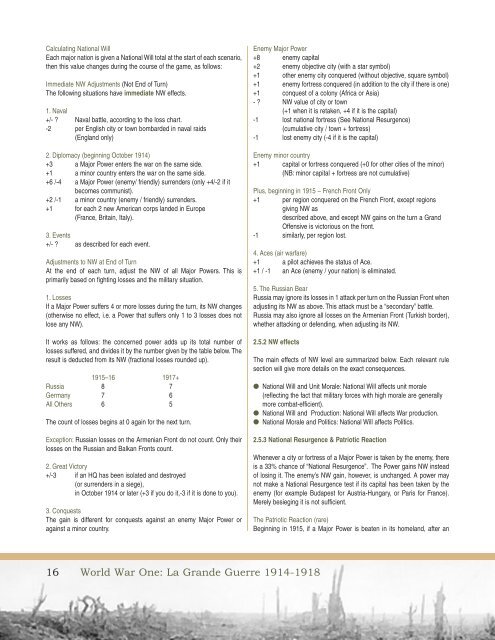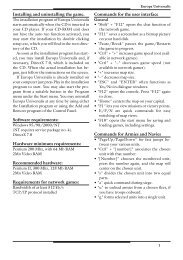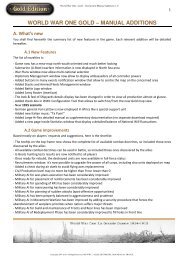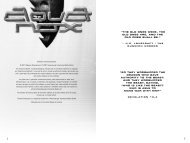Create successful ePaper yourself
Turn your PDF publications into a flip-book with our unique Google optimized e-Paper software.
Calculating National Will<br />
Each major nation is given a National Will total at the start of each scenario,<br />
then this value changes during the course of the game, as follows:<br />
Immediate NW Adjustments (Not End of Turn)<br />
The following situations have immediate NW effects.<br />
1. Naval<br />
+/- ? Naval battle, according to the loss chart.<br />
-2 per English city or town bombarded in naval raids<br />
(England only)<br />
2. Diplomacy (beginning October 1914)<br />
+3 a Major Power enters the war on the same side.<br />
+1 a minor country enters the war on the same side.<br />
+6 /-4 a Major Power (enemy/ friendly) surrenders (only +4/-2 if it<br />
becomes communist).<br />
+2 /-1 a minor country (enemy / friendly) surrenders.<br />
+1 for each 2 new American corps landed in Europe<br />
(France, Britain, Italy).<br />
3. Events<br />
+/- ? as described for each event.<br />
Adjustments to NW at End of Turn<br />
At the end of each turn, adjust the NW of all Major Powers. This is<br />
primarily based on fighting losses and the military situation.<br />
1. Losses<br />
If a Major Power suffers 4 or more losses during the turn, its NW changes<br />
(otherwise no effect, i.e. a Power that suffers only 1 to 3 losses does not<br />
lose any NW).<br />
It works as follows: the concerned power adds up its total number of<br />
losses suffered, and divides it by the number given by the table below. The<br />
result is deducted from its NW (fractional losses rounded up).<br />
1915–16 1917+<br />
Russia 8 7<br />
Germany 7 6<br />
All Others 6 5<br />
The count of losses begins at 0 again for the next turn.<br />
Exception: Russian losses on the Armenian Front do not count. Only their<br />
losses on the Russian and Balkan Fronts count.<br />
2. Great Victory<br />
+/-3 if an HQ has been isolated and destroyed<br />
(or surrenders in a siege),<br />
in October 1914 or later (+3 if you do it,-3 if it is done to you).<br />
3. Conquests<br />
The gain is different for conquests against an enemy Major Power or<br />
against a minor country.<br />
16 World War One: La Grande Guerre 1914-1918<br />
Enemy Major Power<br />
+8 enemy capital<br />
+2 enemy objective city (with a star symbol)<br />
+1 other enemy city conquered (without objective, square symbol)<br />
+1 enemy fortress conquered (in addition to the city if there is one)<br />
+1 conquest of a colony (Africa or Asia)<br />
- ? NW value of city or town<br />
(+1 when it is retaken, +4 if it is the capital)<br />
-1 lost national fortress (See National Resurgence)<br />
(cumulative city / town + fortress)<br />
-1 lost enemy city (-4 if it is the capital)<br />
Enemy minor country<br />
+1 capital or fortress conquered (+0 for other cities of the minor)<br />
(NB: minor capital + fortress are not cumulative)<br />
Plus, beginning in 1915 – French Front Only<br />
+1 per region conquered on the French Front, except regions<br />
giving NW as<br />
described above, and except NW gains on the turn a Grand<br />
Offensive is victorious on the front.<br />
-1 similarly, per region lost.<br />
4. Aces (air warfare)<br />
+1 a pilot achieves the status of Ace.<br />
+1 / -1 an Ace (enemy / your nation) is eliminated.<br />
5. The Russian Bear<br />
Russia may ignore its losses in 1 attack per turn on the Russian Front when<br />
adjusting its NW as above. This attack must be a “secondary” battle.<br />
Russia may also ignore all losses on the Armenian Front (Turkish border),<br />
whether attacking or defending, when adjusting its NW.<br />
2.5.2 NW effects<br />
The main effects of NW level are summarized below. Each relevant rule<br />
section will give more details on the exact consequences.<br />
● National Will and Unit Morale: National Will affects unit morale<br />
(reflecting the fact that military forces with high morale are generally<br />
more combat-efficient).<br />
● National Will and Production: National Will affects War production.<br />
● National Morale and Politics: National Will affects Politics.<br />
2.5.3 National Resurgence & Patriotic Reaction<br />
Whenever a city or fortress of a Major Power is taken by the enemy, there<br />
is a 33% chance of “National Resurgence”. The Power gains NW instead<br />
of losing it. The enemy’s NW gain, however, is unchanged. A power may<br />
not make a National Resurgence test if its capital has been taken by the<br />
enemy (for example Budapest for Austria-Hungary, or Paris for France).<br />
Merely besieging it is not sufficient.<br />
The Patriotic Reaction (rare)<br />
Beginning in 1915, if a Major Power is beaten in its homeland, after an
















